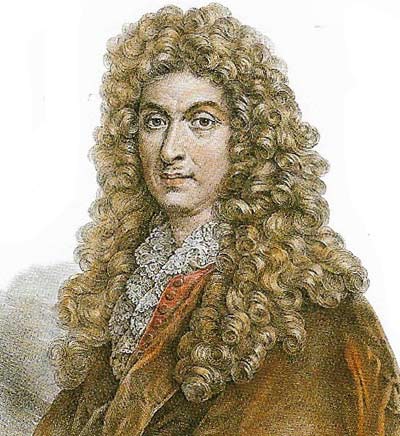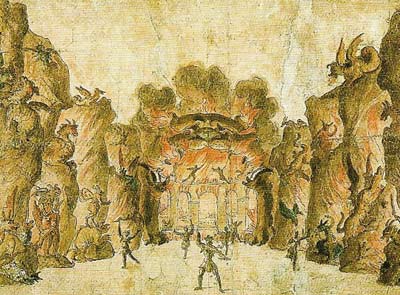Lully, Jean-Baptiste (1632–1687)

Jean-Baptiste Lully, court composer to Louis XIV.

An original stage design by Jean Berain for Lully's tragédie-lyrique, Armide, first performed at the Académie Royale de Musique in Paris in 1686.
The founder of French opera owed his success partly to his exceptional talent, and partly to his ruthless, ambitious nature – only Wagner has rivalled Lully (pronounced "loo-lee") in sheer single-mindedness of purpose and grandiose vision. His career mirrored that of his patron, the "Sun King" Louis XIV (1643–1715), perhaps the greatest European monarch of his age, who saw his own glory reflected in the sumptuous entertainments devised by his clever court composer.
King and composer enjoyed a close, symbiotic relationship: indeed Lully's death, in 1687 at the age of only 55, marked the zenith of the Sun King's reign. Thereafter it was a long, slow story of royal decline, marked by personal misfortunes and military defeats.
The ambitious page
The son of a humble Florentine miller, Lully's singing voice was spotted at the age of 13 and he was taken to Paris and employed as a pageboy to a distant member of the royal family. Having perfected his own talents for dancing and playing the violin, he applied himself to social climbing, and quickly got his first royal appointment. His job was to write music for the lavish court ballets, and to drill the orchestra which accompanied them, the Vingt-quatre violons du roi. He soon established himself as a strict disciplinarian with a quick temper – later in life, as director of the opera house in Paris, he allegedly punched his pregnant leading lady in the stomach, causing her to miscarry, rather than jeopardize his productions.
Lully's ruthless nature suited his purposes well. He made an expedient marriage in order to disguise his homosexuality – a predilection which the king (a great lover of women) abhorred and consolidated his position at court by choosing as his bride the daughter of the court composer, Michael Lambert. Meanwhile he cultivated the playwright Moliere (1622–1673), with whom he collaborated on several comédies-ballets (a hybrid form – half play, half ballet) for the entertainment of the court. The most famous of these was Le bourgeois gentilhomme (1670).
Opera at Versailles and Paris
Lully's next move, in 1672, was to take advantage of the bankruptcy of a fellow musician who had obtained a royal licence to import Italian opera. Lully seized the licence for himself, and while continuing to supply music for lavish court entertainments at the magnificent new palace of Versailles, he established a virtual monopoly over operatic productions, opening his own opera house in a disused tennis court in Paris. The following year he turned his old friend Molière's troupe of actors out of their centrally-sited theater in the Palais Royal, and took it over, with the king's permission, rent-free.
Over the next 14 years, Lully and the poet Philippe Quinault (1635–1688) produced a succession of brilliant operas in an entirely new and original style. These "lyric tragedies" were based on subjects drawn from mythology and legend (such as Isis, Thésée, Phaëton, and Armide), worked into plots which subtly flattered Louis XIV – his victories, his devotion to duty, and his personal concept of glory. Audiences of the time loved them – as did the king. Lully had struck gold, and made a huge fortune.
A bizarre end
Lully's court position required him to compose sacred music for the royal chapel, and while conducting a Te Deum written to celebrate Louis XIV's recovery from illness, he accidentally struck his foot with the heavy stick he used to mark the beat by banging it on the floor. Gangrene set in, but Lully refused to have the toe amputated.
As he lay dying, he was visited by a priest. In a final dramatic gesture to mark his penitence, Lully threw his last opera manuscript on to the fire, and received absolution. After the priest had gone, a horrified friend asked Lully why he had wantonly destroyed his last great work. "Don't worry," whispered the dying man, "I've got another copy!"


